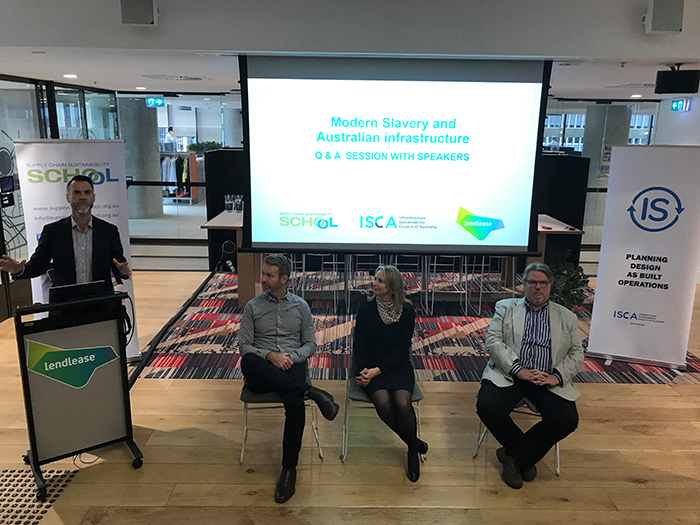Highlighting the hidden issue of Modern Slavery
Highlighting the hidden issue of Modern Slavery
by Marie-Louise ter Beek
Slavery to most people is a historical artefact of less enlightened times with no relevance in the modern world. The notion that it somehow survived historical attrition and can potentially be so insidious and pervasive as to present a risk to capital infrastructure projects in Australia seems like a news bite from a parallel universe.
The stark reality though is that slavery-like practices are still prevalent around the world today, including here in Australia.
Like so many heinous crimes, ‘modern slavery’ is often hidden in plain sight and flourishes in an environment of ambivalence and complacency. And in case anyone is tempted to think that this is all just a little too fanciful to believe, in its recently completed Inquiry into Establishing a Modern Slavery Act, the Australian Parliament’s Joint Standing Committee on Foreign Affairs, Defence and Trade acknowledged the Walk Free Foundation’s Global Slavery Index estimates that:
- More than 40 million people around the world are victims of some form of modern slavery, which includes human trafficking, slavery, debt bondage, forced labour and other slavery-like practices;
- 30,435,300 people in Asia-Pacific Region are ‘enslaved’ (66.4 per cent of all people enslaved); and
- 4,300 in Australia are enslaved.
Against this background, discussion of modern slavery at ISCA’s recent Brisbane workshop, ‘Discover how Modern Slavery impacts Australian Infrastructure projects’, was timely especially given that the Federal Government introduced the Modern Slavery Bill into parliament on the same day.
In opening the workshop, Robin Mellon, CEO of the Supply Chain Sustainability School highlighted a recently released report prepared for the School by Ernst and Young entitled ‘Modern Slavery in Australian property, construction and infrastructure supply chains’.
The main purpose of the ISCA event was to create a better understanding of what is meant by ‘modern slavery’ and its key risk areas for Australian infrastructure supply chains.
Mr Mellon spoke about how the Modern Slavery Act in the UK has created change by elevating modern slavery as an issue.He made specific reference to how both government and business have developed a range of training products to help raise awareness and assist people better spot the signs, as well as increasing confidence in reporting modern slavery when potential cases are encountered.
The UK legislation also empowers internal advocates within companies enabling them to both internally through access to senior management, as well as externally with factual data and empirical evidence enforce standards with suppliers.
Attendees heard case studies of how some Australian organisations are already making changes to address modern slavery issues and gained insights into how infrastructure procurement, products and materials decisions will be made when the Modern Slavery Bill becomes law (most likely later this year).
ISCA’s newly appointed CEO Ainsley Simpson highlighted that organisations looking to address modern slavery needed to focus on high risk areas and where they have material issues.
Leading Australian businessman and philanthropist Andrew Forrest joined the event via a pre-recorded video address and spoke as the co-founder (with daughter Grace) of the Walk Free Foundation.
Mr Forrest also highlighted the importance of forward-looking due diligence with the blunt and sobering statement that, “If slavery is discovered by anyone but you, expect investor withdrawal.”
Michael Steele, QLD/NT Environment, Sustainability and Community Manager from Lendlease showcased the changes made by that organisation and what industry can do to address modern slavery, including reviewing processes regularly. Mr Steele closed his presentation by outlining Lendlease’s non-price selection criteria and stated if a supplier can add value to a project then this will be considered.
David Baggs, CEO and Program Director from Global Green Tag was able to provide recommendations for reporting options on modern slavery. His presentation also outlined how to undertake certification and source certified products and materials.
Mr Mellon summarised and closed the event with the prediction that within three years Australian companies would be profiling their modern slavery declarations/statements online, enabling procurement and contracting choice for products and services to be informed by those declarations.
The workshop wrapped up with a takeaway top 10 for how to manage modern slavery implications:
- Know what modern slavery means, so you can talk about it with your teams, clients and suppliers.
- Understand why how much you know about your supply chain really matters – from a risk and opportunity viewpoint.
- Work out who is covered by the forthcoming Act -either directly, or as part of larger supply chains or projects.
- Discover your main areas of risk around processes, products, materials, countries, knowledge or communication.
- Remember TRANSARENCY is the goal not perfection.
- This is a slow shift not overnight change, potentially 3,4,5 years.
- Education is key, your staff, clients and suppliers all need a basic understanding of what questions will you ask?
- Understanding where to go for more information.
- Familiarise yourself with what to do if modern slavery is found or suspected e.g. a hotline number or a discussion.
- Have a crisis management plan in place for when (not if) modern slavery is found.
ISCA would like to thank the speakers, Mr Robin Mellon from the Supply Chain School, Mr David Baggs from Global Green Tag, Mr Michael Steele from Lendlease, Mr Andrew Forrest from the Walk Free Foundation and Mr Chris Crewther MP, Joint Standing Committee on Foreign Affairs, Defence & Trade for presenting at the event. ISCA would also like to thank Lendlease as the event would not have not been possible without their generosity to host the event at their exquisitely designed Brisbane head office in Bowen Hills, Brisbane.


